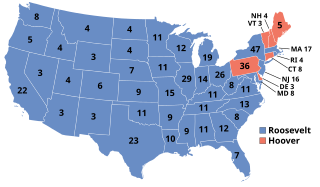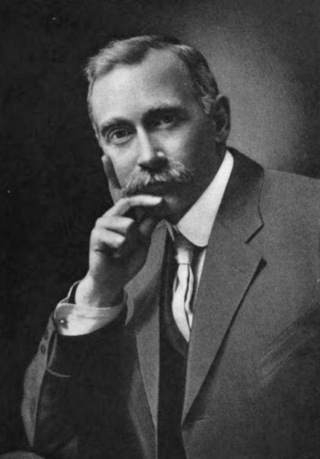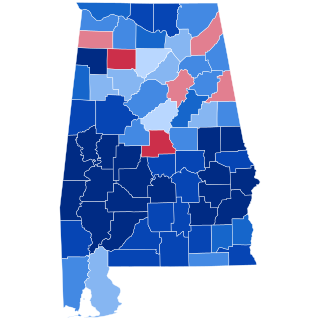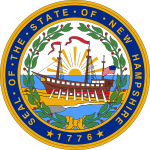
Presidential elections were held in the United States on November 8, 1932. Against the backdrop of the Great Depression, incumbent Republican President Herbert Hoover was defeated in a landslide by Democrat Franklin D. Roosevelt, the governor of New York and the vice presidential nominee of the 1920 presidential election. The election marked the effective end of the Fourth Party System, which had been dominated by Republicans, and it was the first time since 1916 that a Democrat was elected president.

The New Hampshire Senate is the upper house of the New Hampshire General Court, alongside the lower New Hampshire House of Representatives. The Senate has been meeting since 1784. The Senate consists of 24 members representing Senate districts based on population. There are 16 Republicans and 8 Democrats currently serving in the Senate.
The Massachusetts Republican Party (MassGOP) is the Massachusetts branch of the U.S. Republican Party.

Henry Floyd Samuels (1869–1948) was an American attorney, politician, mining executive, and farmer. He was the leading spokesman of the Idaho chapter of the Non-Partisan League and later the Idaho Progressive Party in the 1910s and 1920s.

Vermont's 2012 general elections were held on November 6, 2012. Primary elections were held on August 28, 2012.

The 1920 United States presidential election in Alabama took place on November 2, 1920, as part of the 1920 general election, in which all 48 states participated. Alabama voters chose twelve electors to represent them in the Electoral College via popular vote pitting Democratic nominee James M. Cox and his running mate, Assistant Secretary of the Navy Franklin Roosevelt, against Republican challenger U.S. Senator Warren G. Harding and his running mate, Governor Calvin Coolidge.

The 1926 United States Senate election in Illinois took place on November 2, 1926.
Progressive conservatism is a political ideology that attempts to combine conservative and progressive policies. While often still supportive of a capitalist economy, it stresses the importance of government intervention in order to improve human and environmental conditions.

The 1912 United States presidential election in Wisconsin was held on November 5, 1912 as part of the 1912 United States presidential election. State voters chose 13 electors to the Electoral College, who voted for president and vice president.

The 1912 United States presidential election in Maine took place on November 5, 1912, as part of the 1912 United States presidential election which was held throughout all contemporary 48 states. Voters chose six representatives, or electors to the Electoral College, who voted for president and vice president. Maine was won by the Democratic nominees, New Jersey Governor Woodrow Wilson and Indiana Governor Thomas R. Marshall. Wilson and Marshall defeated incumbent President William Howard Taft, and his running mate Vice President James S. Sherman and Progressive Party candidates, former President Theodore Roosevelt and his running mate California Governor Hiram Johnson.

The 1952 United States presidential election in Alabama took place on November 4, 1952, as part of the 1952 United States presidential election. Alabama voters chose eleven representatives, or electors, to the Electoral College, who voted for president and vice president. In Alabama, voters voted for electors individually instead of as a slate, as in the other states.

The 1944 United States presidential election in Alabama took place on November 7, 1944, as part of the 1944 United States presidential election. Alabama voters chose eleven representatives, or electors, to the Electoral College, who voted for president and vice president.

The 1940 United States presidential election in Alabama took place on November 5, 1940, as part of the 1940 United States presidential election. Alabama voters chose 11 representatives, or electors, to the Electoral College, who voted for president and vice president. In Alabama, voters voted for electors individually instead of as a slate, as in the other states.

The 1914 Massachusetts gubernatorial election took place on November 3, 1914. Democratic Governor David I. Walsh defeated the Republican, Samuel W. McCall, and the Progressive, Joseph Walker, and won reelection with 45.93% of the vote.

The 1936 United States presidential election in Alabama took place on November 3, 1936, as part of the nationwide presidential election. Voters chose eleven representatives, or electors to the Electoral College, who voted for president and vice president. In Alabama, voters voted for electors individually instead of as a slate, as in the other states.

The 1932 United States presidential election in Alabama took place on November 8, 1932, as part of the nationwide presidential election. Alabama voters chose eleven representatives, or electors, to the Electoral College, who voted for president and vice president. In Alabama, voters voted for electors individually instead of as a slate, as in the other states.

The 1924 United States presidential election in Alabama took place on November 4, 1924, as part of the nationwide presidential election, which was held throughout all contemporary forty-eight states. Voters chose twelve representatives, or electors, to the Electoral College, who voted for president and vice president.

The 1912 Rhode Island gubernatorial election was held on November 5, 1912. Incumbent Republican Aram J. Pothier defeated Democratic nominee Theodore F. Green with 43.67% of the vote.

The 1912 North Dakota gubernatorial election was held on November 5, 1912. Republican nominee L. B. Hanna defeated Democratic nominee Frank O. Hellstrom with 45.45% of the vote.

The 1912 Indiana gubernatorial election was held on November 5, 1912. Democratic nominee Samuel M. Ralston defeated Progressive nominee Albert J. Beveridge and Republican nominee Winfield T. Durbin with 42.95% of the vote. The vote splitting between the Republican and Progressive nominees benefited Democrat Ralston tremendously in this election.






















